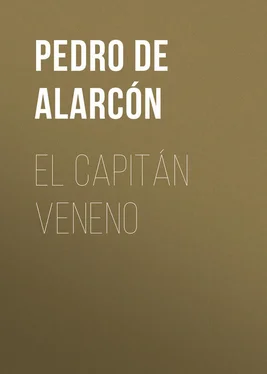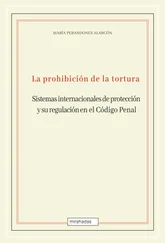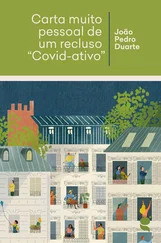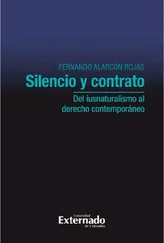Pedro de Alarcón - El Capitán Veneno
Здесь есть возможность читать онлайн «Pedro de Alarcón - El Capitán Veneno» — ознакомительный отрывок электронной книги совершенно бесплатно, а после прочтения отрывка купить полную версию. В некоторых случаях можно слушать аудио, скачать через торрент в формате fb2 и присутствует краткое содержание. Жанр: foreign_antique, foreign_prose, на испанском языке. Описание произведения, (предисловие) а так же отзывы посетителей доступны на портале библиотеки ЛибКат.
- Название:El Capitán Veneno
- Автор:
- Жанр:
- Год:неизвестен
- ISBN:нет данных
- Рейтинг книги:3 / 5. Голосов: 1
-
Избранное:Добавить в избранное
- Отзывы:
-
Ваша оценка:
- 60
- 1
- 2
- 3
- 4
- 5
El Capitán Veneno: краткое содержание, описание и аннотация
Предлагаем к чтению аннотацию, описание, краткое содержание или предисловие (зависит от того, что написал сам автор книги «El Capitán Veneno»). Если вы не нашли необходимую информацию о книге — напишите в комментариях, мы постараемся отыскать её.
El Capitán Veneno — читать онлайн ознакомительный отрывок
Ниже представлен текст книги, разбитый по страницам. Система сохранения места последней прочитанной страницы, позволяет с удобством читать онлайн бесплатно книгу «El Capitán Veneno», без необходимости каждый раз заново искать на чём Вы остановились. Поставьте закладку, и сможете в любой момент перейти на страницу, на которой закончили чтение.
Интервал:
Закладка:
– ¡Angustias! ¡Te he dicho que no vas!
– No iré, si no quieres: pero, madre mía, piensa en que mi pobre padre, tu noble y valeroso marido, 56 56 tu… marido , thy husband : in plays and novels the author must make sure the reader or hearer gets the point; hence the insistence here upon the two relationships of the one man.
no habría muerto, 57 57 no habría… si… hubiese : in this text there are many substitutes for this typical or chief form of the condition [ si -clause] and conclusion [ habría here].
como murió, desangrado, en medio de un bosque, 58 58 medio (or mitad in the sense of medio ) seldom has the article.
la noche de una acción, si alguna mano misericordiosa hubiese restañado la sangre de sus heridas…
– ¡Angustias!
– ¡Mamá!.. ¡Déjame! ¡Yo soy tan aragonesa como mi padre, aunque he nacido en este pícaro Madrid! – Además, no creo que a las mujeres se nos haya 59 59 haya : even such words as creer , ver , saber , verbs that usually have que and the indicative, will take the subjunctive after a negative word or sense.
otorgado ninguna bula, dispensándonos de tener tanta vergüenza y tanto valor como los hombres.
Así dijo aquella buena moza; y no se había repuesto su madre del asombro, acompañado de sumisión moral o involuntario aplauso, que le produjo tan soberano arranque, cuando Angustias estaba ya cruzando impávidamente la calle de Preciados.
V
TRABUCAZO
¡Mire usted, señora! ¡Mire qué hermosa 60 60 hermosa : adjective here for our adverb, as usual with ir , venir , etc. So to a waiter: mi sopa, y ligero [ bring ] my soup and [ bring it ] quick .
va! – exclamó la gallega, batiendo palmas y contemplando desde la reja a nuestra heroína…
Pero, ¡ay!, en aquel mismo instante sonó un tiro muy próximo; y como la pobre viuda, que también se había acercado a la ventana, viera 61 61 viera , saw : here Latin viderat , had seen , with indicative sense survives, as in Portuguese. Common in Spanish along the border of Portugal.
a su hija detenerse y tentarse la ropa, lanzó un grito desgarrador, y cayó de rodillas, casi privada de sentido.
– ¡No diéronle! 62 62 ¡No diéronle! and (18, 7) ¡Diéronle! – exclamó con su gramática de Mondoñedo ; but Alarcón himself doesn't need to scold Mondoñedo; post-placed pronouns are frequent in Alarcón's own style. The order with the negative is especially noteworthy.
¡No diéronle! – gritaba en tanto la sirvienta. – ¡Ya entra en la casa de enfrente! Repórtese la señora…
Pero ésta no la oía. Pálida como una difunta, luchaba con su abatimiento, hasta que, hallando fuerzas en el propio dolor, alzose medio 63 63 medio : This form serves as noun, adjective, or adverb. In line 11 it is adverbial, whereas in line 12 it is substantive.
loca y corrió a la calle… en medio de la cual se encontró con la impertérrita Angustias, que ya regresaba seguida del médico. 64 64 seguida del , followed by : a true passive.
Con verdadero delirio se abrazaron y besaron madre e hija, precisamente sobre el arroyo de sangre vertida por el Capitán, y entraron al fin en la casa, sin que 65 65 sin que… se enterase nadie , without that any one noticed or knew , without any one's noticing .
en aquellos primeros momentos se enterase nadie de que 66 66 de que , of [ the fact ] that ; so hasta que , till ; but según regularly without que .
las faldas de la joven estaban agujereadas por el alevoso trabucazo que le disparó el hombre de la buhardilla al verla atravesar la calle…
La gallega fue quien, no sólo reparó en ello, sino quien tuvo la crueldad de pregonarlo.
– ¡Diéronle! – ¡Diéronle! – exclamó con su gramática de Mondoñedo. – ¡Bien hice yo en no salir! ¡Buenos forados habrían abierto las balas en mis tres refajos!
Imaginémonos un punto el renovado terror de la pobre madre, hasta que Angustias la convenció de que estaba ilesa. Básteos saber que, según iremos viendo, la infeliz guipuzcoana no había de gozar hora de salud desde aquel espantoso día… Y acudamos ahora al malparado Capitán, a ver qué juicio forma de sus heridas el diligente y experto doctor Sánchez.
VI
DIAGNÓSTICO Y PRONÓSTICO
Envidiable reputación tenía aquel facultativo, y justificola 67 67 justificola : this order with la at the end is almost a mannerism with Alarcón. Inconsistently, the Academy leaves the marked accent here, but marks the preterit in díjole , as it does all verb forms whose accented syllable, by reason of the post-placing of pronouns, comes to occupy proparoxytonic or anteproparoxytonic position: toma , tómalo , tómatelo ; tomar , tomarlo , tomárselo ; tomando , tomándolo , tomándoselo , etc.
de nuevo en la rápida y feliz primera cura que hizo a nuestro héroe, restañando la sangre de sus heridas con medicinas caseras, y reduciéndole y entablillándole la fractura 68 68 fractura = rotura .
de la pierna sin más auxiliares que las tres mujeres. Pero como expositor de su ciencia, no se lució tanto, pues el buen hombre adolecía del vicio 69 69 vicio de Pero Grullo : a perogrullada is an explanation of something already clear, a definition of self-evident facts, and repeats the thought in other words without adding anything much. You might as well kill a fellow as scare him to death is a perogrullada . For a whole set of perogrulladas , see Goldsmith's Madam Blaise . Hamlet's Words, words, words is of the same nature, and many times in Hamlet besides: cf. There isn't in all Denmark an infamous man who isn't a great villain , Hamlet I. 3. If the king likes not the comedy, why then he likes it not, perdy , Hamlet III. 2. Or take the phrase attributed to Lincoln: If people like that sort of a thing that is about the sort of a thing they will like. There is also the proverbial phrase in Spanish: Es una verdad de Perogrullo (or Pero Grullo ), que a la mano cerrada llamaba puño . Cf. Luis Montoto y Rautenstrauch: Personajes, personas y personillas , etc., Sevilla, 1912, vol. II, pp. 304-5.
de Pero Grullo.
Desde luego respondió de que el Capitán no moriría, "dado que saliese antes de veinticuatro horas de aquel profundo amodorramiento", indicio de una grave conmoción cerebral causada por la lesión que en la frente le había producido un proyectil oblicuo (disparado con arma de fuego, sin quebrantarle, 70 70 quebrantarle : the third word for break .
aunque sí contundiéndole, el hueso frontal), "precisamente en el sitio en que tenía la herida, a consecuencia de nuestras desgraciadas discordias civiles y de haberse mezclado aquel hombre en ellas"; añadiendo en seguida, por vía de glosa, que si la susodicha conmoción cerebral no cesaba dentro del plazo marcado, el Capitán moriría sin remedio, "en señal de haber sido demasiado fuerte el golpe del proyectil; y que, respecto a si cesaría o no cesaría la tal conmoción antes de las veinticuatro horas, se reservaba su pronóstico hasta la tarde siguiente".
Dichas estas verdades de a folio, recomendó muchísimo, y hasta con pesadez (sin duda por conocer 71 71 por conocer , because he knew .
bien a las hijas de Eva), que cuando el herido recobrase el conocimiento no le permitieran hablar, ni le hablaran ellas de cosa alguna, por urgente que les pareciese entrar en conversación con él; dejó instrucciones verbales y recetas escritas para todos los casos y accidentes que pudieran sobrevenir; quedó en 72 72 quedó en , agreed : cf. English they left it that way ; and German dabei blieb es , so it was settled . The verb quedar means remain , but in the phrase quedar en gets the meaning agree , much as the English words settle [ a matter ], rest [ the case ], developed a sense of conclusion or agreement.
volver al otro día, aunque también hubiese tiros, a fuer de hombre tan cabal como buen médico y como inocente orador, y se marchó a su casa, por si 73 73 por si , for fear that = por si acaso .
le llamaban para otro apuro semejante; no, empero, sin aconsejar a la conturbada viuda que se acostara temprano, pues no tenía el pulso en caja, y era muy posible que le entrase una poca fiebre al llegar 74 74 al + infinitive, at nightfall : good example of temporal use of this construction.
la noche… (que ya había llegado).
Интервал:
Закладка:
Похожие книги на «El Capitán Veneno»
Представляем Вашему вниманию похожие книги на «El Capitán Veneno» списком для выбора. Мы отобрали схожую по названию и смыслу литературу в надежде предоставить читателям больше вариантов отыскать новые, интересные, ещё непрочитанные произведения.
Обсуждение, отзывы о книге «El Capitán Veneno» и просто собственные мнения читателей. Оставьте ваши комментарии, напишите, что Вы думаете о произведении, его смысле или главных героях. Укажите что конкретно понравилось, а что нет, и почему Вы так считаете.












